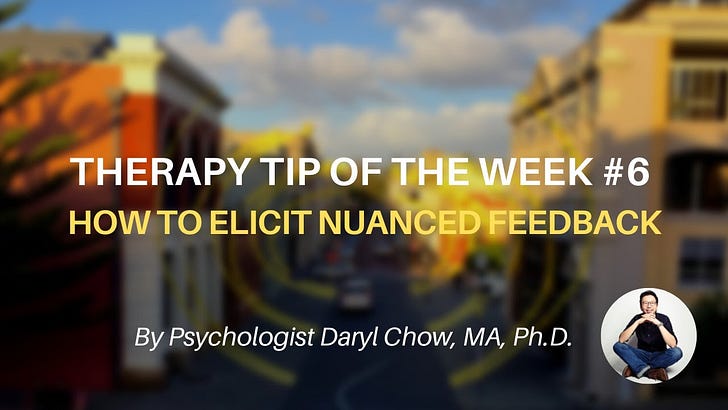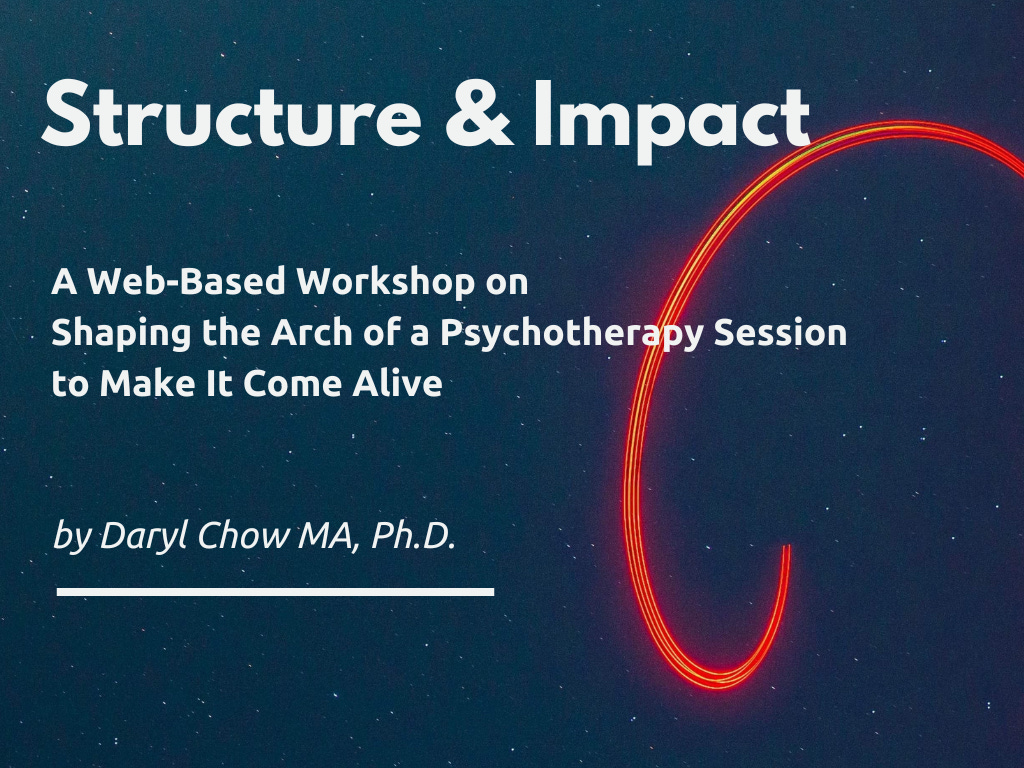Frontiers Friday 107 Alliance (Part IV) ⭕️
1 New video, relevant reflections, and the missing discount code for the new course, Structure & Impact.
The Ordinary Magic of Therapy
Magic is a strange art form. If you stop to think about it, the magician is the only one in the room who does not experience the magic.
Uncle Frankie was a magician. A really good one. My cousins and I were constantly in awe by the things he have up his sleeves.
I was constantly trying to outsmart him and burst him bubble. And here's what I discovered later in my life: Even if I figured out his "trick," I could not perform the magic the way he did it.
In other words, information is not transformation.
When we bring magic to others, we get to experience a different kind of magic: The magic of witnessing someone experience a sudden moment of transformation.
Therapy is like magic. It's bizarre. The air pressures leaving your mouth, converting into sounds and meaning enters the heart and mind of the other, and for better or worse, creates an impact on the other person. The measure of alliance, therefore, is a good indicator of this magician craft.
All of us are magicians, really. We have the power to do what my Uncle Frankie does. First, we must be intentional. Then we can find a way. The relational craft is to learn the praxis of language to become transmitters of our intent.
And, perhaps more importantly, to let the words of the other alter us.
FF107: Alliance (Part IV)
This week, we return to Part IV on the topic of Working Alliance in therapy. We have a new related Therapy Tip of the Week video, and other useful articles.
In case you missed it, here's the previous missives on the topic of Alliance:
FF104 Alliance (Part I)
FF105 Alliance (Part II)
FF106 Alliance (Part III)
🎥 New Video from Frontiers, Therapy Tip of The Week #6: How to Elicit Nuanced Feedback
In Therapy Tip of the Week #6, we continue on the topic of improving working alliance. Here's my recommendation: When seeking for feedback, avoid talking about... you! If you have missed the previous videos on how to improve working alliance, here are links:
i. Seek to be Disconfirmed
ii. The Devil is the Details Between Sessions
⏳ Time Stamps:
00:00: Introduction
01:00: Using Depersonalised language
01:42: What Feedback is Not
02:02: Feedback to Feed-Forward
04:14: Summary📜From the Frontiers Archives: To Be Altered
Turns out that our willingness to be changed affects clients' outcome.📜From the Frontiers Archives: What Does General Athleticism Got to Do With Psychotherapeutic Skills?
What are the implications if alliance ability is like your general fitness in any sports?👓 Research: Untangling the Alliance–Outcome Correlation: Exploring the Relative Importance of Therapist and Patient Variability in the Alliance
Not the most appealing title, but dismantling studies are super useful for us to understand what's really going on under the hod.
This 2007 study is a landmark study. Baldwin, Wampold and Imel were able to untangle the alliance-outcome correlation, and what they found was that a staggering 97% of the differences in therapist outcomes was explained by therapist’s alliance ability!
(This type of numbers are usually unheard of in social sciences).
In other words, some therapists have this relational ability to engage with a wide variety of people.
Note: This figure from the study illustrates that differences in alliance, leading to improvement in symptom reduction, is due not to the differences within a therapist’s caseload, but due to the differences between therapists. In other words, some therapists were much better at alliance formation. ⏸ Words Worth Contemplating:
"Our intention is to affirm this life, not to bring order out of chaos, nor to suggest improvements in creation... But simply to wake up to the very life we're living.”
~ John Cage.
Reflection:
When was the last time you've changed your mind?
What was it about?
Train your mind to be willing to be altered, to be updated, to learn.
Write them down, number and date them.
Make it a habit to look back at them.
A measure of success is how embarrassed you feel of yourself a year ago.
Structure and Impact Course
Last week, I introduced the new course, Structure and Impact. I received several emails asking the missing link and the promo code. This is now fixed. Apologies for the glitches.
The course is $200, and with the promo code, you'd get $80 off. Just key in at the checkout, 80GIFT. Easy peasy.
And if you are a student/trainee, the course if my gift to you. Click the enrolment page, scroll to the bottom to select the appropriate button.
Even though the course has not yet been released, people are saying things like, "Why don't they teach this in our program?"
The Structure and Impact course is specifically designed to help you shape the arch of a psychotherapy session so that you can make the psychotherapeutic encounter come alive.
I hope you’d join us.
Details:
Start: 10th of Oct 2022, World Mental Health Day.
Length: 1 month duration with 4 in-depth sections to Structure and Impact provided on a weekly basis.
Format: Interactive cohort-based, and self-paced (i.e., no need to log on at specific times).
Access: Not time-limited; Lifetime-Access.
Cost:
For Professionals: $200, with $80 off using the promo code: 80GIFT
For Trainees: Free.
(A few weeks ago, my friend said to me that this was a risky move. People could simply select the free option. I know. You could. I could ask for id proof that you are indeed a student. But I didn't build Frontiers of Psychotherapist Development to be transactional. We just have to rely on a handshake).
BIG HUGS TO NEW PEOPLE WHO ARE AT THEIR FRONTIER!
If you've just joined us, I'm glad you can join us at the "bleeding edge." Feel free to check out the back catalogue of Frontiers of Psychotherapists Development (FPD). You might also want to go into specific topics in the FPD Archives like
And if you want to see past newsletters, the entire archive is now made available in substack.
In case you missed it, see the most recent missives
Devotion to the Craft (6 Parts)
Caring for People in Organisations (3 Parts)
Clinical Supervision (3 Parts)
Feedback Informed Treatment (4 Parts)
Unintended Consequences (2 Parts)
Deep Learner (4 Parts)
Going Further with Deep Learner and The Use of Obsidian (6 Parts)
See What You Hear, Hear What You See (4 Parts)
Trauma (3 Parts)
Deliberate Practice (5 Parts)
Empathy (6 Parts)
Therapist Effects (2 Parts)
Client Point of View (4 Parts)
Tech Tools for Therapists (4 Parts)
Emotions (6 Parts)
Sensitivity (3 Parts)
My other blog site is called FullCircles: Reflections on Living
By the way, don't feel bad if you want to unsubscribe to this newsletter. This might not be for you. The last thing I want is to add to the anxious clutter of our inboxes.
Daryl Chow Ph.D. is the author of The First Kiss, co-author of Better Results, and The Write to Recovery, and the forthcoming books, Creating Impact, and The Field Guide to Better Results.
Note: These newsletter are free, many hours are spent handpicking the curated list that make it to Frontiers Friday, as well as writing the essays and recording the videos and podcasts. Amazon affiliate links, if any, are to help ease the cost of these missives.
P/s: Please excuse any typos!






Hi Daryl, firstly, thank you for your commitment and regular gift of knowledge about ROM Deliberate Practice and lots of other important things about working more effectively with clients.
My use of ORS/SRS waxes and wanes, and I feel like I am about to increase its "routine" use again. The SRS related video was super useful. I have read articles about its development and evidence around usefulness.
What would you recommend as a public domain article targeted at people already using ORS/SRS and want to get even better in its use?
Peter